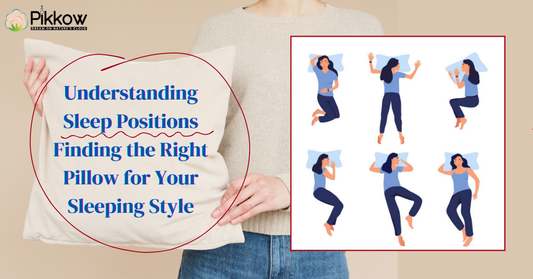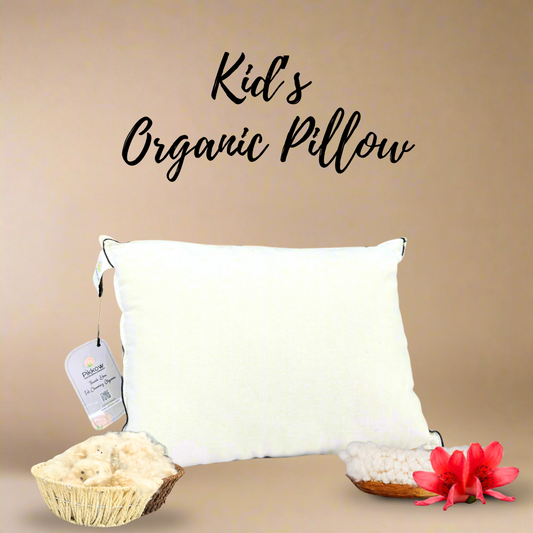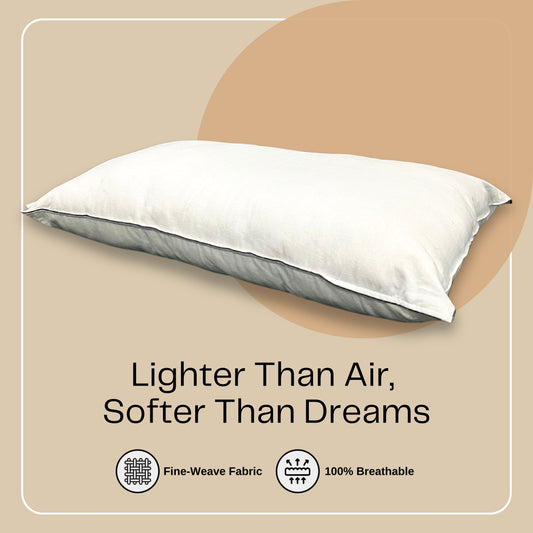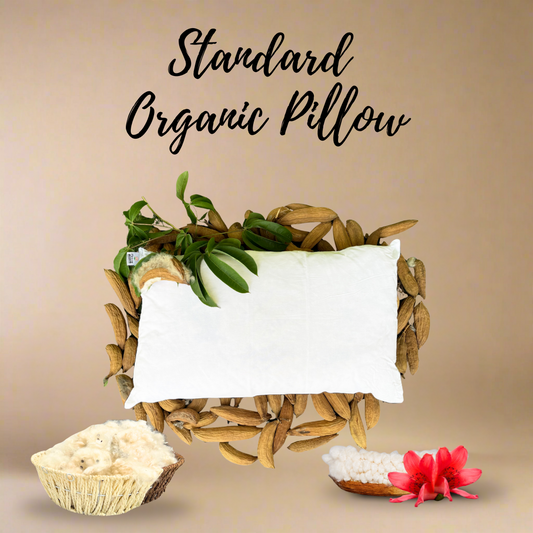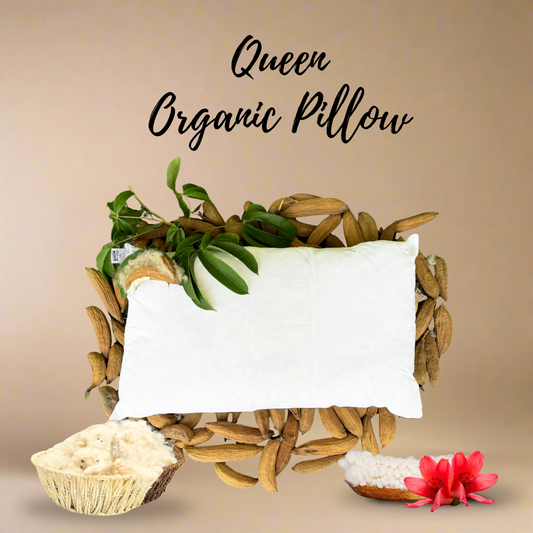Most people blame stress, late-night scrolling, or caffeine for their poor sleep — but very few ever suspect their pillow. Yet studies show that the wrong pillow can affect everything from spinal alignment to hormones to breathing patterns. What’s scarier? Most synthetic pillows contain chemicals, microplastics, and heat-trapping fibers that silently interfere with your body’s natural sleep rhythm.
If you’ve been waking up tired, restless, or stiff, you may be missing the hidden signs of unhealthy pillow problems right under your head.
This guide reveals the top 5 signs your pillow is secretly disrupting your sleep cycle, how synthetic pillows worsen sleep quality, and why switching to a natural kapok pillow — such as PIKKOW’s organic pillow — can be the cleanest upgrade you make this year.
Understanding the Hidden Sleep Disruptors in Your Pillow
Your pillow plays a bigger role in your sleep cycle than you think. A bad pillow can interfere with:
-
Temperature regulation
-
Neck alignment
-
Breathing quality
-
Allergy responses
-
Skin and hair health
-
Hormonal recovery
-
Deep sleep cycles
These issues are often caused by synthetic pillow effects, like trapped heat, off-gassing chemicals, dust mites, and microplastic shedding.
Let’s break down the biggest warning signs.
1. You Wake Up With Neck or Shoulder Stiffness
The first major signs of unhealthy pillow issues appear in your body — specifically your neck.
A pillow that’s too flat, too thick, or made from unsupportive synthetic material can force your neck into awkward angles all night. This disrupts your spine’s natural curvature, causing:
-
Neck stiffness
-
Shoulder pain
-
Morning headaches
-
Tingling in arms or fingers
-
A feeling of “tightness” in the upper back
Synthetic pillows often sag quickly, losing their firmness, forcing your body into misalignment.
Why Natural Kapok Helps
Kapok fiber (used in PIKKOW pillows) is naturally buoyant and supportive, contouring to the neck without collapsing. This helps maintain proper alignment through the entire sleep cycle.
2. You’re Overheating or Sweating at Night
If you’re constantly flipping your pillow to the “cool side,” you’re dealing with one of the most ignored signs of unhealthy pillow quality: trapped heat.
Synthetic pillows like polyester, memory foam, and microfiber:
-
Hold body heat
-
Reduce airflow
-
Cause sweating
-
Trigger nighttime restlessness
-
Interrupt deep sleep cycles
Overheating is one of the top poor sleep symptoms because it prevents your brain from entering restorative stages of sleep.
Why Kapok Is Cooler
Kapok is one of the most breathable natural fibers in the world.
It contains naturally hollow air pockets that allow heat to escape — making it ideal for India’s warm climate and people prone to night sweats.
3. You’re Sneezing, Coughing, or Have Itchy Skin at Night
Do your allergies act up only when you lie down? That’s a major red flag.
Dust mites, synthetic fibers, and chemical fragrances cause many unseen synthetic pillow effects, such as:
-
Sneezing
-
Nasal blockage
-
Dry throat
-
Coughing
-
Itchy, irritated skin
-
Watery eyes
-
Morning congestion
Many pillows also off-gas volatile organic compounds (VOCs), which irritate the respiratory system.
Why Natural Pillows Make a Difference
Kapok is naturally:
-
Hypoallergenic
-
Resistant to dust mites
-
Chemical-free
-
Gentle on sensitive skin
This makes it a superior choice for kids, elders, and anyone with asthma or sinus issues.
4. Your Pillow Smells “Chemical” or Musty
If your pillow gives off an odor — new or old — it’s one of the strongest signs of unhealthy pillow contamination.
There are two types of dangerous smells:
1. Chemical smell
Usually from:
-
Polyester filling
-
Memory foam
-
Synthetic dyes
-
Fire retardants
These fumes can cause headaches and disrupt healthy sleep patterns.
2. Musty smell
Usually from:
-
Moisture buildup
-
Mold or mildew
-
Dust mite waste
-
Sweat absorption
Both indicate it’s time to pillow detox — and possibly replace your pillow altogether.
Why Kapok Doesn’t Smell
Kapok fiber is naturally moisture-resistant and anti-microbial, meaning it doesn’t trap sweat or develop musty odors.
5. You Don’t Feel Rested Even After 8 Hours of Sleep
This is the ultimate warning sign.
If you wake up feeling:
-
Foggy
-
Drained
-
Heavy-headed
-
Sluggish
-
Irritated
-
Anxious
Your pillow may be sabotaging your sleep cycle.
Poor-quality pillows disrupt your ability to enter:
-
Deep sleep
-
REM sleep
-
Slow wave recovery sleep
These are essential for memory, mood balance, hormone regulation, and energy levels.
Why Kapok Boosts Deep Sleep
Natural fibers help the body relax by providing:
-
Better airflow
-
Soft cradle-like comfort
-
No chemical stressors
-
Balanced temperature
All of these support uninterrupted rest — the foundation of a healthy sleep cycle.
Mid-Blog Highlight: Why PIKKOW Pillows Are a Cleaner, Safer Choice
Many Indian families are now switching to PIKKOW Kapok pillows for one simple reason — purity.
PIKKOW uses:
-
100% organic Kapok fiber (no synthetic fillers)
-
GOTS-certified organic cotton covers
-
No chemicals, toxins, or microplastics
-
Handcrafted quality for comfort and durability
The result?
A natural pillow that supports posture, breathability, and allergy-free sleep — making it an ideal upgrade for kids, elders, and sensitive sleepers.
PIKKOW solves the exact signs of unhealthy pillow issues that synthetic pillows create.
How to Know It’s Time to Replace Your Pillow
Here are clear indicators:
-
It has lumps
-
It doesn’t return to shape
-
It smells musty
-
It makes you sweat
-
It triggers allergies
-
It feels flat or uneven
-
It’s older than 18–24 months
If even one is true, your pillow has completed its life cycle.
The Clean Sleep Upgrade: Why Natural Always Wins
Switching to a natural pillow like Kapok provides:
|
BENEFIT |
SYNTHETIC PILLOW |
NATURAL KAPOK PILLOW |
|
Breathability |
Low |
High |
|
Odor Resistance |
Poor |
Excellent |
|
Allergies |
High risk |
Naturally hypoallergenic |
|
Skin safety |
Chemical exposure |
Chemical-free |
|
Heat control |
Traps heat |
Stays cool |
|
Eco-friendly |
No |
Yes |
|
Sleep quality |
Often restless |
Deep, calm sleep |
A natural pillow is not just a bedding choice — it’s a health upgrade.
Conclusion: Your Pillow May Be Small — But Its Impact Is Huge
The wrong pillow can quietly sabotage your sleep cycle, leading to pain, allergies, fatigue, and long-term health disruptions. Recognizing the signs of unhealthy pillow issues early can help you protect your sleep and overall well-being.
Making the switch to a natural option like the PIKKOW Organic Kapok Pillow is one of the simplest, cleanest, and most effective ways to improve your nightly rest.
After all, if you spend one-third of your life sleeping — don’t you deserve to sleep on something healthy?
FAQs
1. What are the top signs my pillow is unhealthy?
Neck pain, sweating, allergies, odors, and unrested mornings are major signs your pillow is affecting your sleep cycle.
2. Can synthetic pillows cause allergies?
Yes. Synthetic pillows trap dust mites, heat, and chemicals, which can trigger respiratory and skin issues.
3. What is the healthiest pillow for Indian families?
Kapok pillows are ideal — natural, hypoallergenic, breathable, and perfect for the Indian climate.
4. How often should I replace my pillow?
Every 18–24 months, or sooner if you notice discomfort or odor.
5. Are PIKKOW Kapok Pillows worth it?
Absolutely. They are chemical-free, breathable, and handcrafted to support clean, restorative sleep — perfect for kids, elders, and sensitive sleepers.



